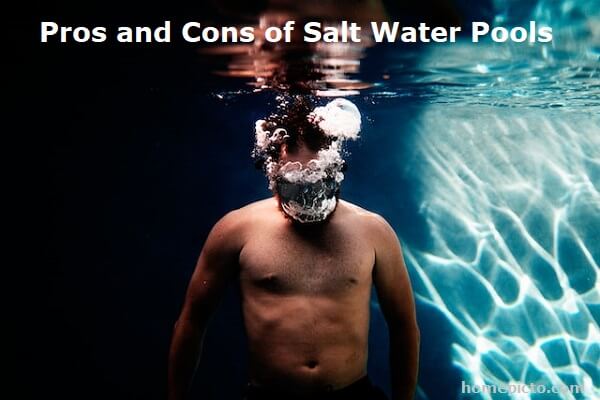Some claim swimming in a diluted saline solution is similar to a shower in soft water. The belief that saltwater pools are more natural and healthier for you and your skin is one of its appeals. The chlorine smell may also attract other pool filtration system alternatives. A popular yet untrue assumption about saltwater swimming pools is that they are chlorine-free. Instead of adding chlorine directly to the collection, it employs already-applied salt and a chlorine generator.
To further inform people about saltwater pools' dangers and potential advantages, we've listed the Pros and Cons of Salt Water Pools.
A salt-chlorine generator is a specialized machinery used to chlorinate a saltwater pool. For this kind of pool, you can use ordinary salt as long as it doesn't have too many contaminants. Chlorine and sodium are the two main components of salt. The device (salt chlorine generator) converts salt into hypochlorous acid, which acts as a disinfectant when water comes into contact with it.You don't need to add salt or chlorine to the system regularly. It is due to the continual recombination of hypochlorous acid with sodium in the water, which results in salt. As with conventional pools, there is no need to be concerned about chloramine buildup.
Compared to conventional pools, saltwater ones have several significant benefits. Before buying one, you should be aware of some of its drawbacks. Let's examine some advantages and disadvantages of saltwater pools.
Because there is less chlorine in saltwater pools, it is kinder to the skin, hair, eyes, and swimwear. Unlike conventional chlorine pools, they don't have a strong chemical odor.
Comparatively speaking, saltwater pools are less expensive. For saltwater pools, the initial investment is substantial. After the initial expenditure, however, it's simpler to maintain. Consequently, compared to conventional chlorine pools, saltwater pools are less expensive over time.
In saltwater pools, the electrolyzer automates the water treatment procedure, greatly simplifying maintenance. Salt replenishment is far less frequent than the pebbles used for disinfection in chlorine pools.
There are fewer health risks associated with saltwater pools than conventional chlorine pools because they are more natural. The salt has no smell and poses less threat to your customers' allergies and skin and eye discomfort. When people think of saltwater pools, they frequently picture the ocean, yet this couldn't be further from the truth. The salinity of saltwater pools is only around one-tenth that of the sea.
Your clients don't need to store these chemicals in their sheds or homes because saltwater pools don't need the addition of excess chlorine. It is risk-free for your customer's family and good for the environment because it doesn't release chemical contaminants. Additionally, saltwater pools feature softer water, which many patrons can genuinely appreciate.
A saltwater pool's initial cost is more significant. Salt chlorine generators can cost between $400 and $2,000 to build, depending on whether the pool is above-ground or in-ground, made of fiberglass or gunite. On the other hand, they require less maintenance and typically have minimal long-term running expenses.
The other significant drawback of saltwater pools is corrosion, typically outside the pool. When pool water splashes out, most decking can sustain damage because it isn't saltwater resistant. Your skin, eyes, and hair will benefit significantly from converting salt into chlorine. However, it can harm metal items like ladders, heaters, and more.
Check your saltwater pool frequently to prevent rusting. You can engage our pool company in Magnolia and Montgomery to help with this. Our professionals can take care of any pool-related repairs or replacements.
To handle repairs on saltwater pools, you need knowledge. Only a specialist should do maintenance on the complicated electrolytic salt chlorine generator. They will ensure your equipment is operating correctly and the water is secure for you and your family.
When salt uses to treat a pool, the pH level tends to rise; thus, keeping close track of these values is essential. A pH regulator is necessary to make changes as the levels increase.
The corrosive nature of salt is well known. In light of the preceding, salt in saltwater pools may only frequently clean, corrode and harm the electrolyzer prematurely if self-cleaning. It can prevent you from putting in the heaters, fixtures, underwater lights, stonework, or liners your customers want.
Saltwater pools often cost more to install at first than conventional reservoirs do. Even if the cost of the raw materials may be lower, installing and purchasing the electrolyzer drive up the price. Additionally, because they are more complicated than conventional pools, they will require more maintenance, even for minor issues.
Conclusion: Are Saltwater Pools Secure?
You will clean your swimming pool with saltwater. It accomplishes this via electrolysis to create a disinfectant. Both saltwater and conventional chlorine pools have the same sanitizing power. Saltwater collections, however, offer certain advantages over chlorine pools in terms of safety. For instance, they don't produce chloramines, which can irritate your skin and eyes. Additionally, these pools use fewer chemicals. So definitely, saltwater pools are secure.

They are more complicated than conventional pools, and even simple issues frequently call for qualified experts. You may need to avoid utilizing heaters, fixtures, underwater lights, liners, and even masonry work since salt can harm some materials.
Less chlorine and a strong chemical smell and content are present. It causes less irritation to the eyes, hair, and swimwear while being kinder to the skin. Compared to chlorinated water, the water feels softer and silkier. Compared to chlorinated pools, they require less upkeep.
Fiberglass Pool: One of the key factors making a fiberglass pool easier to maintain is that it is less prone to algae growth. Anyone seeking a collection that doesn't need a lot of upkeep should consider choosing a fiberglass pool.
By significantly lowering chlorine and other chemicals we have historically used, ultraviolet systems deliver the healthiest water possible for swimming pools and spas. It universally acknowledged the use of chlorine to clean swimming pools as being unhealthy.